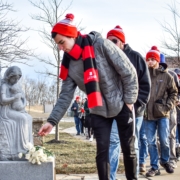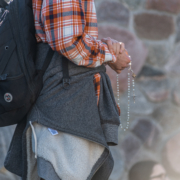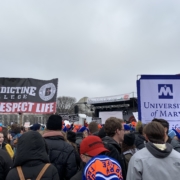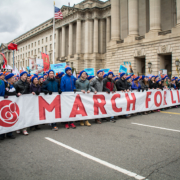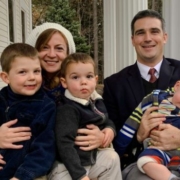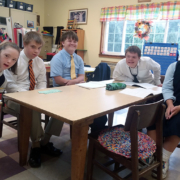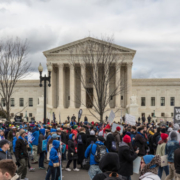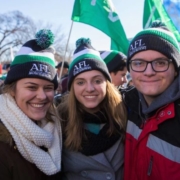Some Colleges Are Pro-Life Year-Round
Last week, hundreds of students from faithful Catholic colleges traveled to Washington, D.C., for the March for Life, which went full-steam ahead after canceling last year and in spite of citywide COVID restrictions. Many colleges sent delegations, some of them quite large, but there is something especially heartening about the delegations from those colleges that remain thoroughly pro-life and faithfully Catholic year-round, in and out of season.
Attending the March for Life isn’t just a “once a year” activity — it’s not something done just for the fun of it or for a travel experience. Rather, colleges featured in The Newman Guide and the Register’s Catholic college guide strive to be pro-life all year long: being pro-life is part of the very fabric and identity of the colleges. Let’s take a look at some of the activities that these colleges do throughout the year.
Benedictine College
In addition to sending about 15-20 percent of its student population to the March for Life — which is an extensive journey — the Ravens Respect Life group does much to support the local pro-life cause. Not only do they pray at local abortion clinics, but they also sponsor training for and engage in sidewalk counseling. They assist local families in need by volunteering at the local crisis pregnancy center. Their support for pro-life issues extends from conception to natural death: they also visit the elderly in nursing homes.
Moreover, as Steve Johnson explained, “The college Alumni Relations Office encourages Benedictine families and alumni to participate in their area pro-life rallies and marches throughout the year with our Ravens for Life program. We send them signage to carry at their event to show the affiliation with Benedictine College.” The pro-life cause at Benedictine College continues well beyond graduation.
Ave Maria University
At Ave Maria University, students organize a trip to the March for Life, while also praying for an end to abortion outside the local Planned Parenthood once a week.
The university also sponsors the Jon Scharfenberger scholarship for Catholic pro-life leaders attending the university. The scholarship was created in honor of a 2011 AMU graduate who passed away in a tragic car accident a year following graduation while on his way home from a pro-life event. As reported in the recent edition of the Ave Maria magazine, while attending the university, he volunteered frequently at a local pregnancy center without anyone else knowing — and he didn’t even have a car to get there, which increased the wonder of how he was able to do so. Such a scholarship holds up Jon’s life as a witness to the importance of pro-life work for every student who attends Ave Maria.
Finally, an initiative on campus provides babysitting for fellow students so that they are able to continue attending classes and complete their degrees. They also offer confidential services including pregnancy testing and post-abortion counseling.
University of Mary
Looking to the University of Mary, pro-life is written across their entire identity with their motto, “UMary for Life!” Not only does it hint at the university’s intent to form the whole student in its education, according to Ed Konieczka, assistant director of University Ministry at the University of Mary, it also means that “we stand for life at all stages.”
For example, given the ongoing pandemic last year, “We planned the first annual North Dakota March for Life, gathering entities around the state. Our efforts resulted in a March and Rally at the state capital that was attended by 1500 people, including almost 400 people from the University of Mary. This year, the second annual state March for Life will take place at the exact same time as the national March — we will have students, faculty and staff marching simultaneously at the state capitol and in the nation’s capital.”
But their pro-life activities don’t just end with the March for Life. As Ed added, “Over this past year, our Collegians for Life organization sponsored a coffee house fundraiser to raise funds for prolife causes, brought in a guest speaker from the Students for Life, hosted a natural family planning information night, had a spiritual adoption tabling event, and served tables at the local Women’s Care Center Bingo Fundraising event.”
Finally, the university has pro bono clinics, which are entirely student-run and serve everyone, especially those who are uninsured or underinsured. These clinics ensure a culture of life on campus — serving those who need it most.
Allison Eiynck is a freshman this year at the university: ever since infancy, she has lived with multiple synostosis syndrome, which means that the joints in her elbows, fingers, toes and feet bones are fused, and she has brachydactyly, meaning that she is missing partial digits in her ring and pinkie fingers. She also needs hearing aids to assist with her hearing. As she explained in a press release, “I am not able to bend my arms, so I cannot reach my face, head, or certain areas above my waist.”
When she first arrived at the university, she really struggled to manage with daily tasks, especially because this was the first time that she would be completely independent. Thanks to the Pro Bono Occupational Therapy Clinic on campus, however, she was able to receive the help she needed to thrive and be independent. The second-year OT doctoral students worked creatively to come up with ideas to help her perform daily tasks that so many of us take for granted — using a straightener, putting in a ponytail, putting on a winter hat.
As one example, she explained to the Newman Society, “The stocking cap was very helpful and effective. Think of it as you’re putting a trash bag into the garbage can. The garbage can is small and made of plastic. I would put my hat in, like a trash bag with the edges hanging over. This created an opening for me to simply pick up the trash can, flip it upside down, and slide my head into it to place the hat onto my head. Then I would remove it from the trash can using my arms and adjust as needed.”
The importance of such a small object is monumental for someone like Eiynck. “This assistance that was provided respected my human dignity. I felt the OT students were more than happy to find ways to help me become independent, and they didn’t make me feel like I was different from anyone else.
“As an individual with a disability, it’s not fun,” she continued. “I always feel like eyes are on me when I’m out in public eating or just walking in general. The pro-bono clinic allows people with limitations to be independent and successful daily. It gives individuals more confidence to be on their own and make them feel wanted in this world.”
These are but a few examples of how Newman Guide colleges remain pro-life all year round, not just during the March for Life. Hopefully, these examples can be inspiring to others who are looking for ways to serve the pro-life cause no matter what time of year, from conception to natural death.
This article first appeared at the National Catholic Register.

